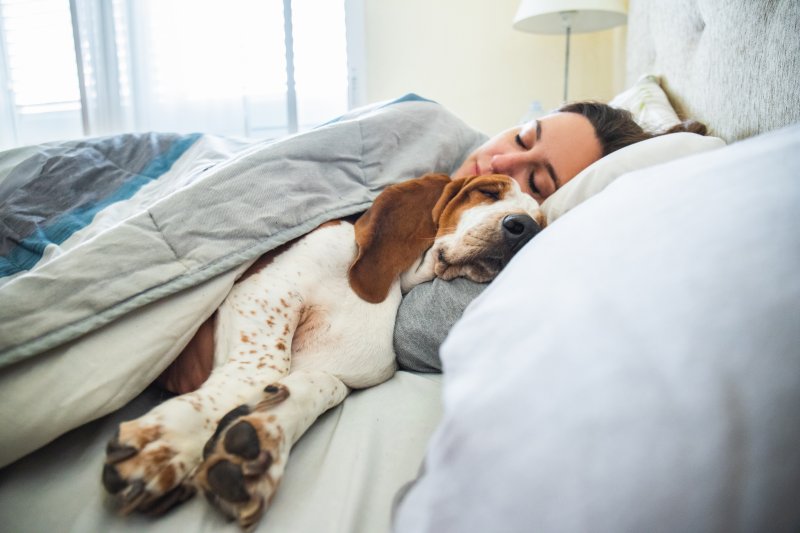
As you might imagine, letting a pet stay in your bed has upsides. Your furry friend can help you feel calm, secure, and at ease as you rest. With that said, those adopting this bedtime routine should be careful. There’s a good chance your pet is affecting your sleep apnea, causing you to snooze less peacefully. To learn the details, just let your Topeka sleep dentist explain things in this brief and helpful summary.
Context: What’s Sleep Apnea?
Before we delve into the pet issue, you’ll need to brush up on sleep apnea’s basics. Doing so helps you see why your companion might disrupt your nights.
Sleep apnea is a health issue that makes you stop breathing while asleep. It’s usually caused by a blockage of your airway, which prevents you from inhaling enough. The resulting lack of oxygen triggers a survival reflex that wakes you up, disrupting your sleep cycle. Sleep apnea thus prevents proper rest and puts a strain on your whole physical body.
All in all, various factors can raise your risk of sleep apnea. Some of the more common ones include a family history, heart problems, large tonsils, and obesity.
How Could Your Pet Affect It?
As long as they aren’t too wild, snoozing in the same bed as a pet usually doesn’t affect sleep much. However, things change when you suffer from sleep apnea.
Your pet’s presence at night would likely aggravate your sleep apnea. For instance, the animal might make sounds or movements that keep you from falling asleep. (Many pets get restless before bedtime.) Their dander could also trigger allergies and nasal congestion, increasing your risk of nighttime apnea episodes.
Given the points above, cuddling with your pet in bed may not pan out. Doing so might actually make your night less restful than ever.
How Should You Respond?
If you don’t want your pet to worsen your sleep apnea, take the following steps:
- No Pets in Bed – Don’t let your pet share your bed. At most, have them curl up in a corner of your bedroom at night.
- Keep a Clean Room – Regularly wash and vacuum your bedsheets and bedroom floor. That way, allergy-triggering pet dander won’t disrupt your breathing.
- Get Treatment – If you insist on having your pet nearby, try getting a sleep apnea treatment from your local dentist. They can provide you with a custom oral appliance that’ll help you.
While your pet affecting your sleep apnea is possible, it’s not inevitable. Just use the tips above and consult your sleep dentist for advice!
About the Practice
Sleep Solutions & TMJ Pain Therapy is based in Topeka, KS. Led by the amazing Dr. Michael E. Michel, our practice is dedicated to helping each patient snooze more soundly. We thus offer effective and well-researched therapies for sleep apnea, TMJ/TMD disorder, and similar problems. Whatever is disrupting your rest, our team will get you through it! For more details or to book a visit, please contact us on our website or by phone at (785)-273-0801.
